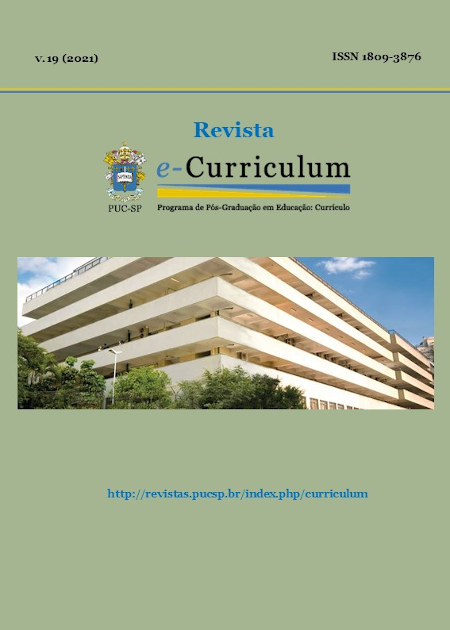CURRICULAR INNOVATION: GAMMED LEARNING PROCESSES MEDIATED BY DIGITAL TECHNOLOGIES
DOI:
https://doi.org/10.23925/1809-3876.2021v19i2p564-587Keywords:
Curriculum, Learning processes, Gamification, Digital technologiesAbstract
This article reports an experience developed in the educational computing curriculum component of the Department of Computing, UFS, in the 2019/2 academic semester. It aims to analyze the development process of gamification proposals from the perspective of interdisciplinary and collaborative knowledge construction. It is a research approved by the official scientific initiation level program at UFS. It is a participant-intervention type, based on Thiollent (2011), in collective discussion processes for curriculum innovation mediated by digital technologies. The gamification proposals built by the students and their reports on Google Form meet the curricular knowledge articulated with other areas of knowledge, thus being confirmed as a significant experience for the construction and reconstruction of knowledge.
References
ALVES, Flora. Gamification: como criar experiências de aprendizagem engajadoras - um guia completo - do conceito à prática. 2. ed. Revisado e ampliado. São Paulo: DVS Editora, 2015.
ARDOINO, Jacques. Abordagem Multirreferencial (plural) das situações educativas e formativas. In: BARBOSA, Joaquim (Coord.). Multirreferencialidade nas ciências e na educação. São Carlos, SP: EdUFSCar, 1998. p. 24-41
AUSUBEL, David Paul. Educational psychology: a cognitive view. New York: Holt, Rinehart and Winston, 1968.
BARTLE, Richard. Hearts, clubs, Diamonds, spades: players who suit muds. 1996. Disponível em: http://mud.co.uk/richard/hcds.htm. Acesso em: 10 mar. 2020.
GIL, Antonio Carlos. Métodos e técnicas de pesquisa social. 6. ed. São Paulo: Atlas, 2001.
GIMENO SACRISTÁN, José. O currículo: uma reflexão sobre a prática. Porto Alegre: Artmed, 2000.
KAPP, Karl M.; BLAIR, Lucas; MESCH, Rich. The gamification of learning and istruction – Fieldbook. Idea sinto practice. San Francisco: Willey, 2014.
KELLER, John M. Motivational Design of Instruction. In: Reigeluth, C. M. Instructional Design Theories and Models. An Overview of their Current Status. New Jersey: Lawrence Earlbaum Associates Hillsdale, 1983. p. 384-433.
KOLB, David A. Experiential learning: Experience as the source of learning and development. Englewood Cliffs, New Jersey: Prentice Hall. 1984. Disponível em: http://www.learningfromexperience.com/images/uploads/process-of-experiential-learning.pdf. Acesso em: 19 mar. 2020.
MACEDO, Elisabeth. Mas a escola não tem que ensinar? Conhecimento, reconhecimento e alteridade na teoria do currículo. Currículo sem fronteiras. v. 17, n. 3, p. 539-554, set./dez. 2017. Disponível em: http://www.curriculosemfronteiras.org/vol17iss3articles/macedo.pdf. Acesso em: 15 mar. 2020.
MALONE, Thomas W. Toward a Theory of Intrinsically Motivating Instruction. Cognitive Science, v. 5, n. 4, p. 333-369, out. 1981, Wiley-Blackwell. Disponível em: https://onlinelibrary.wiley.com/doi/epdf/10.1207/s15516709cog0504_2. Acesso em: 25 maio 2020.
MINAYO, Maria Cecília de Souza. O desafio do conhecimento: pesquisa qualitativa em saúde. São Paulo: Editora Hucitec, 2010.
MORIN, Edgar. O método 3: conhecimento do conhecimento. Trad. Juremir Machado da Silva. 5. ed. Porto Alegre: Sulina, 2015.
SCHLEMMER, Eliane. Gamificação em espaços de convivência híbridos e multimodais: Design e cognição em discussão. Revista da FAEEBA – Educação e Contemporaneidade, Salvador, v. 23, n. 42, p. 73-89, jul./dez. 2014. Disponível em: https://www.revistas.uneb.br/index.php/faeeba/article/view/1029. Acesso em: 16 mar. 2020.
THIOLLENT, Michel. Metodologia da pesquisa-ação. São Paulo: Cortez, 2011.
TRIVINOS, Augusto Nibaldo Silva. Introdução à pesquisa em Ciências Sociais: A pesquisa qualitativa em educação. São Paulo: Atlas. 2013.
WERBACH, Kevin; HUNTER, Dan. For the win: how game thinking can revolutionize your business. Philadelphia: Wharton Digital Press, 2012.
YOUNG, Michael F. Overcoming the crisis in curriculum theory: a knowledge-based approach. Journal of Curriculum Studies, v. 45, n. 2, p. 101-118, 2013. Disponível em: https://www.cambridgeassessment.org.uk/Images/overcoming-the-crisis-in-curriculum-theory-a-knowledge-based-approach.pdf. Acesso em: 17 mar. 2020.
Downloads
Published
How to Cite
Issue
Section
License
Os autores concedem à revista todos os direitos autorais referentes aos trabalhos publicados. Os conceitos emitidos em artigos assinados são de absoluta e exclusiva responsabilidade de seus autores.Todo o conteúdo da Revista e-Curriculum é aberto para acesso público, propiciando maior visibilidade, alcance e disseminação dos trabalhos publicados.











